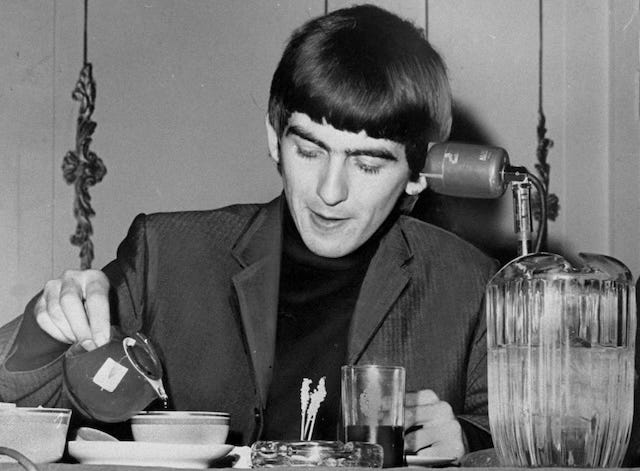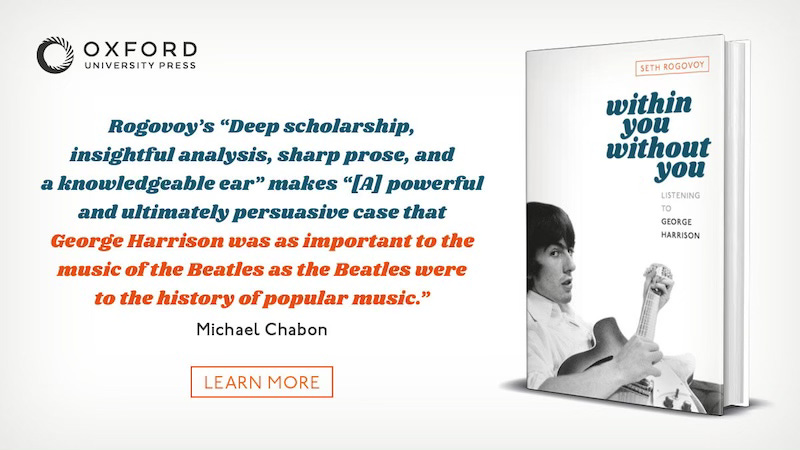
Today — Tuesday, February 25, 2025 — would have been George Harrison’s 82nd birthday. Harrison died in November 2001 at the young age of 58. In his memory, I offer below an excerpt from my recent book — Within You Without You: Listening to George Harrison — discussing “Don’t Bother Me,” the very first song Harrison wrote for the Beatles.
A SCHOOLTEACHER ONCE described George Harrison as a “very quiet, introverted little boy, who would sit in the furthest corner and not even look up”—not afar cry from how Harrison’s dynamic role in the Beatles has been perceived and described for decades. George Harrison was the most unlikely of rock stars. After the first few years of the Beatles, he dreaded performing and touring; he was unhappy about being seen as “a Beatle” rather than as an individual; and, for the most part, he had little use for or interest in the accoutrements of fame, preferring to spend his time quietly in his garden at his beloved English country estate, hanging with a few close friends and loved ones. Harrison once told an interviewer, “The whole Beatles thing is like a horror story, a nightmare. I don’t even like to talk about it. I just hate it.”
Therefore, one could not have asked for a more perfect song to announce George Harrison’s debut as a songwriter for the Beatles than “Don’t Bother Me.” The very title of the song could well stand as a credo for Harrison, an early manifesto capturing his personality and entire mindset about fame, a topic to which he would frequently return in songs including “Only a Northern Song,” “Dark Horse,” “While My Guitar Gently Weeps,” and “Cockamamie Business,” that last a semi-obscure 1989 song whose final line is “Didn’t want to be a star, wanted just to play guitar.”
Written in August 1963, even before full-fledged Beatlemania had taken hold, “Don’t Bother Me” implored its interlocutor to “go away, leave me alone, don’t bother me.”Already Harrison was feeling put upon enough to make this the overall theme to his very first contribution to the group’s repertoire. “Don’t Bother Me” stood out especially in the context of the group’s 1963 album, With the Beatles, alongside such sunny original numbers as “All My Loving,” “I Wanna Be Your Man,” and “Hold Me Tight,”and next to covers of Smokey Robinson’s “You Really Got a Hold on Me” (sung by George) and Meredith Willson’s “Till There Was You” from the Broadway musical The Music Man. As Beatles author Rob Sheffield writes, “‘Don’t Bother Me,’ his first real song, began the ‘George is in a bad mood’ phase of his songwriting, which never ended. ‘Don’t Bother Me’ is a sentiment he kept rewriting his entire life.”
FOR GEORGE, THE VERY FIRST MESSAGE he chose to impart as a Beatles songwriter was that of a back turned: “Leave me alone, don’t bother me.” This, after all, came from the one member of the Fab Four whose first move upon arriving at the Plaza Hotel in New York City in February 1964 was to take a nap. The melody, chord structure, and guitar sound contributed to the song’s overall negative vibe in keeping with its lyrics. The refrain employed a distinctive, descending melody sung over a complicated harmonic background that bounces from major to minor and back again. John Lennon’s electric rhythm guitar is amped with a chunky tremolo, lending the effort an ominous, sickly feel, quite appropriate because Harrison was ill in bed when he wrote the tune. McCartney plays claves (hardwood sticks), adding a Latin feel to the rhythm, which occasionally stutter and trip, conjuring a sense of delirium. The fade-out features an odd, hammer-like sound, as if someone were knocking on the door, further enhancing the fever-dream nature of the number and providing final justification for his “don’t bother me” plea. Little Richard’s “You keep a-knockin’ but you can’t come in” might have been an inspiration. As Beatles historian Kenneth Womack writes, “‘Don’t Bother Me’ would, at its core, prove a remarkably prescient sketch of the complicated relationship its composer would have with fame for the rest of his life.”
“Don’t Bother Me” also hinted at a distinctive approach to songwriting for Harrison — that of the confessional singer-songwriter. Years before that term would come into common use as a reference to a more personal style of songwriting popularized in the early 1970s by the likes of James Taylor, Carole King, Leonard Cohen, and Joni Mitchell—inspired by the examples set by Bob Dylan and Paul Simon in the 1960s — Harrison’s straightforward accounting of his emotional state in “Don’t Bother Me” set him apart from what Lennon and McCartney were doing in song at that time. It would be a while before Harrison would produce another “confessional”-style song presumed to be a true accounting of his feelings, but with Rubber Soul–era songs, including “If I Needed Someone” and “Think for Yourself,” Harrison cemented the approach, which he would carry on largely through his remaining work with the Beatles (in songs that included “I Want to Tell You,” “It’s All Too Much,” and “Something”) as well as in his post-Beatles solo career, which found him more aligned with the prominent singer-songwriters of the time than with his former bandmates, who largely continued to write and record as pop singers—perhaps with the exception of John Lennon. Thus, while it may have been a surprise to see Harrison performing in a duo with Paul Simon on the late-night TV program Saturday Night Live in November 1976, it seems perfectly logical in retrospect. (The two duetted on Harrison’s “Here Comes the Sun” and Simon’s “Homeward Bound.”)
Guitarist and composer Gary Lucas, perhaps best known for his work with Captain Beefheart and Jeff Buckley, finds the seeds of greatness in “Don’t Bother Me.” Lucas told me, “From his very first songwriting contribution of ‘Don’t Bother Me’ on the second Beatles album, you knew you were in the presence of someone who was unafraid to break the mold of ‘Beatles music,’ as defined by Lennon and McCartney. Just to write a minor-key based song is astounding—very rarely done in those days and even now.”
Lucas continues, “‘Don’t Bother Me’ has a distinctively doom-laden quality to it and a very dark lyric of alienated rejection. When you heard ‘Don’t Bother Me’ you knew you were in the presence of greatness and that George Harrison was his own man with a distinctive voice, not only on guitar but in his songwriting. From ‘Don’t Bother Me’ you knew that anytime George was allowed a song it was going to be spectacular.”
English rock singer-songwriter Robyn Hitchcock echoes Lucas’s observations. “The moody, handsome, dark-eyed kid who wrote ‘Don’t Bother Me’ was the chrysalis from which emerged rainbow Krishna George, a sensitive, quavering singer whose voice trembled at the onslaughts of the world,” Hitchcock told me.
HARRISON WROTE “Don’t Bother Me” in August 1963, while holed up in his room at the Palace Court Hotel in Bournemouth. The Beatles recorded it over the course of two days in the studio the next month. Harrison’s vocals are double tracked, but not tightly, leaving space and occasionally time between the two vocal lines. This out-of-sync effect runs through the instrumentation, too—Lennon’s heavily processed, woozy rhythm guitar adds to the sense of instability, as does the off-the-beat crack of the claves. On the verses, Harrison duets with his vocals on lead electric guitar, deftly blending individual notes with chordal figures. The music comes to a split-second halt before George sings the refrain, during which time he lays out on guitar, thereby forefronting his vocals atop John’s tremolo-drenched rhythmic chords, Ringo’s drums, and Paul’s bass. The middle-eight section is a variant of the first two verses, with a different vocal melody line as well as an emotional shift in the lyrics, with the singer fearing he will “never be the same” unless the woman who walked out on him returns. The third verse returns to the main “don’t bother me” theme, followed by an electric-guitar solo that adheres closely to the harmonic structure of the verse. Ringo Starr’s drumming holds the song together when the other instruments threaten to go out of sync or just collapse into chaos—the perfect musical analog to the singer’s emotional breakdown—and the song comes to an end with Harrison intoning “don’t bother me” five times before all that remains is a knocking-on-the-door beat provided by the drummer.
“Don’t Bother Me” was only the first not-love song that would come out of the pen of George Harrison. He would continue to explore the ambiguities of love and the difficulties of relationships in Beatles songs, including “You Like Me Too Much,” “If I Needed Someone,” “I Want to Tell You,” “Long, Long, Long,” and even “Something,” that last often heralded as one of the greatest love songs of the rock era. Harrison would continue to write about love with a more sophisticated, mature understanding of its complexities than what was typical in pop music of the rock era in his solo career. “Don’t Bother Me,” which Harrison wrote at age twenty, was only the beginning.
In solidarity,
“Well, I don’t want to go on the roof.” -- George Harrison
Hey, did you like this edition of Everything Is Broken? If so, please consider clicking on the “LIKE” button at the very end of this message. It matters to the gods of Substack.
Roll Call: Founding Members
Anne Fredericks
Anonymous (9)
Susan Bang
Erik Bruun
Jane & Andy Cohen
Jeffrey N. Cohen
Nadine Habousha Cohen
Fred Collins
Ian Feldman
Fluffforager
Benno Friedman
Amy and Howard Friedner
Jackie and Larry Horn
Richard Koplin
Paul Paradiso
Steve and Helice Picheny
David Rubman
Spencertown Academy Arts Center
Elisa Spungen and Rob Bildner/Berkshires Farm Table Cookbook
Julie Abraham Stone
Mary Herr Tally
Daniel Wollman and Debra Pollack




